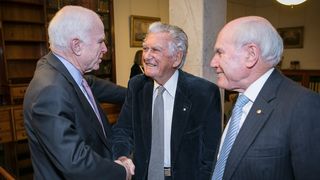Bob Hawke, Australia’s 23rd prime minister and longest serving Labor PM, who died yesterday, changed the face of Australian national politics.
Hawke’s four governments from 1983-1991, shifted both the perception and reality of Labor governments in Canberra. Until Hawke, federal Labor had been viewed as something of an interregnum, positioned between long periods of conservative rule. Bob Hawke, along with Paul Keating, laid the foundations for 13 years of highly successful and highly productive rule. Australian politics changed forever.
Among all the justifiable tributes to the late Labor PM, his role in Australian strategic policy has not been given due weight.
Hawke was an authentic Australian patriot who understood the national interest. Accordingly, as PM he was at pains to safeguard the relationship with the United States and to ensure that Australia did not follow the futile path taken by New Zealand in breaking the trilateralism of the ANZUS treaty.
To the contrary, the Hawke Government renovated ANZUS and confirmed the value of the joint facilities, including Pine Gap, in the maintenance of global peace.
In the first Gulf War, following Iraq’s invasion of Kuwait, Hawke committed Australia as the first American ally in support of President George H. W. Bush’s coalition.
Despite the critics, this focus on a close relationship with the Americans proved broadly popular and contributed to the deep bipartisan support which ANZUS has enjoyed.
Hawke’s own personal popularity could be seen at any public event. Indeed, in the 1983 campaign, he was mobbed as if he were Elvis Presley at the Ed Sullivan Show.
It was a privilege to serve in his government, and he was a truly unique individual in both personal and political terms. He drew strength from the Australian people and they drew strength from him.






